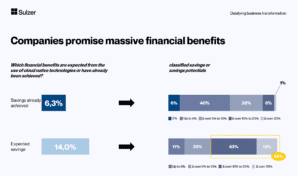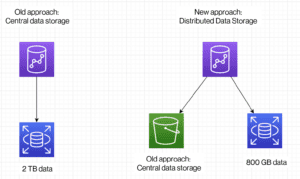The cloud offers many advantages for companies that want to operate their applications flexibly and scalably. According to a study by Lünendonk and Sulzer, 56% of respondents hope to save 20 or more percent on their costs for running their applications in a cloud-native environment.

But the reality is often different: 49% of respondents said they had achieved only five percent or less in actual savings at the time of the study. Our experience with our customers also shows that cloud costs are often higher than expected or even increasing. This leads to disappointment and frustration among companies that had expected more from the cloud. Why is this and what can be done about it?
The answer is not that the cloud is fundamentally too expensive or that expectations are unrealistic. The answer is that the cloud requires a different approach than traditional IT. The cloud is not a static system that is set up once and then forgotten. The cloud is a dynamic system that needs to be constantly monitored, analyzed and optimized. This requires a new role in the company: the FinOps experts.
FinOps stands for Financial Operations and refers to a discipline that deals with the management and optimization of cloud costs. FinOps experts are not just financial managers or controllers, but also have technical know-how and understanding of cloud architecture and business requirements. They work closely with developers, operators and stakeholders to establish and promote a cost culture.
FinOps is based on three principles: Inform, Optimize and Operate
Informing means creating transparency about cloud costs and assigning them to the responsible parties. This includes tools such as billing reports, budgets, notifications and labels that provide an overview of cost development and forecasts. Informing also means relating costs to benefits and defining metrics such as ROI or TCO.
Optimize means adapting cloud resources to actual needs and avoiding or reducing unnecessary or oversized resources. This includes tools such as Azure Advisor, Azure Well-Architected Review or Azure Policy, which provide recommendations for cost savings and offer best practices for an efficient cloud architecture. Optimize also means taking advantage of the various pricing models and offerings from cloud providers, such as reservations, spot VMs or savings plans.
Operate means to continuously monitor and manage cloud costs while reacting agilely to changes. This includes tools such as Azure Cost Management or Azure Monitor, which allow granular analysis of costs by service, region or resource group. Operate also means defining and implementing processes and policies for cost management, involving all stakeholders.
Two examples of the work of FinOps experts
A simple example to see the potential is the storage of data. On-premise, a single data or document database was used for this in the classic case. This must meet the requirements for speed and request load. A classic mistake when migrating to the cloud is to replace this data storage system with a single one in the cloud. For example, a 2 terrabyte database quickly becomes expensive to move to the cloud where it continues to occupy that storage.
The migration should definitely be taken as an opportunity to revise the data storage model. In addition to the many optimization options, here is a simple, tangible example:

For a customer we revised a cloud deployment, which included the 2 TB database. This had to deliver quite fast results and process many requests. An analysis showed that 40% of the contained data has to be kept for 10 years for legal reasons, but eigtl. are hardly requested and if, then the speed does not play a role. So as a very simple cost saving we could store this dedicated data over another service where it was compressed, much slower in availability but therefore much cheaper. The cost savings for data storage was 50%/month just from this change.
An equally handy example is provided by an analysis at another customer who complained about their high costs when exchanging data between different providers and services. As it turned out, gigabytes in the triple-digit range were being exchanged every day, causing correspondingly high costs. One service could be identified as the primary source of the traffic. In short, we made sure to compress the traffic of this service with gzip before it was sent out. Since this was well-compressible text-based traffic, this brought the traffic into the double digits and reduced the cost tremendously.
As can be seen, the examples of use cases are not abstract, unusual special cases, but rather cases that can be identified quite quickly. Our experts, who deal with such requirements on a daily basis, immediately notice these points and can therefore identify initial optimization potential after only a brief analysis and implement it directly if necessary.
With FinOps, you can therefore effectively reduce your cloud costs and achieve your business goals at the same time. At Sulzer GmbH, we have FinOps experts in our team who can help you with this. We would be happy to advise you on your cloud strategy and support you in implementing FinOps in your company.
More news about the cloud:
Chances and hurdles of cloud native software development
Your Expert
Sebastian Junger is our man for the cloud and heads the Cloud delivery unit at Sulzer GmbH. Through years of experience and knowledge, he is the perfect contact person for all topics related to cloud technologies and providers. In various projects, he has supported numerous customers in migrating cloud technologies in their company in a strategically smart and efficient way and can talk about the different approaches and experiences from the inside.




